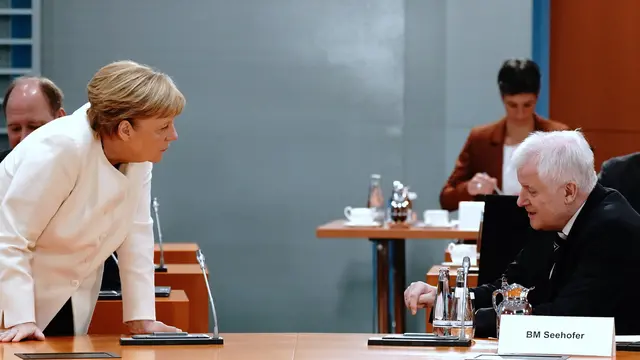
The change of tack is a far-cry from Germany's response to teh 2008 financial crisis, where they advocated and pursued austerity measures across the the European Union. Kay Nietfeld /POOL /AFP
The German cabinet has approved a draft budget for 2021, preparing to write a cheque to cover the second-highest annual deficit since World War II. The highest was this year.
After years of strict rules on limiting public debt, Germany has announced its budget for 2021 includes a shortfall of 96.2 billion euros ($112.3 billion).
The aim is to finance more measures to fight against the COVID-19 outbreak. More than half of the budget is allocated for labor and employment subsidies, reducing health insurance contributions and funding intensive care unit ventilator capacity.
In case you missed it:
•
Arctic Circle: ice floes captured by drone after huge chunk breaks off
• How Europe's air pollution rose as COVID-19 lockdowns eased
• Rewilding the Iberian lynx in Portugal
The German government's common practice was to keep annual deficits below 10 billion euros ($11.68 billion), an eighth of what it has announced on Wednesday.
"We will have an extraordinarily large budget again next year and take out additional loans of almost 100 billion (euros) - a little over 96 billion (euros), exactly," said German Finance Minister Olaf Sholz, during a press conference on Wednesday.
"That is a lot of money that we really need to help stabilize the economy. It is very important," he added.
Change in tact
The budget's commitment to higher spending shows Germany's apparent shift from Europe's poster child for austerity to one of the big spenders.
"For the rest of Europe this means that the best student in class - that has been hammering on austerity - is also doing positive fiscal stimulus," said Carsten Brzeski, chief economist at ING bank.
"So this is kind of leading by example, and other European economies and countries can now also continue with fiscal stimulus," he said.
The new budget sets out 413 billion euros ($482.3 billion) in spending, less than 2020 but more than 2019 and previous years.
The end of the 'black zero'
Budget priorities include artificial intelligence and 5G technology and the environment, with investments outlined for hydrogen, solar, biomass and wind energy.
The 2021 budget seems to mark an end to Germany's famous 'black zero,' its balanced federal budget, based on a 'no borrowing' policy enacted since 2014.
The government said it can afford this high debt level now. But it guarantees this is just temporary. It plans to drop its debt levels to $5.75 billion a year by 2024. Although experts warn much can change before then.
Despite the increase in the budget, Germany continues to have the lowest debt-to-GDP-ratio among the G7 countries. And the government is adamant it will stay that way.
 简体中文
简体中文

